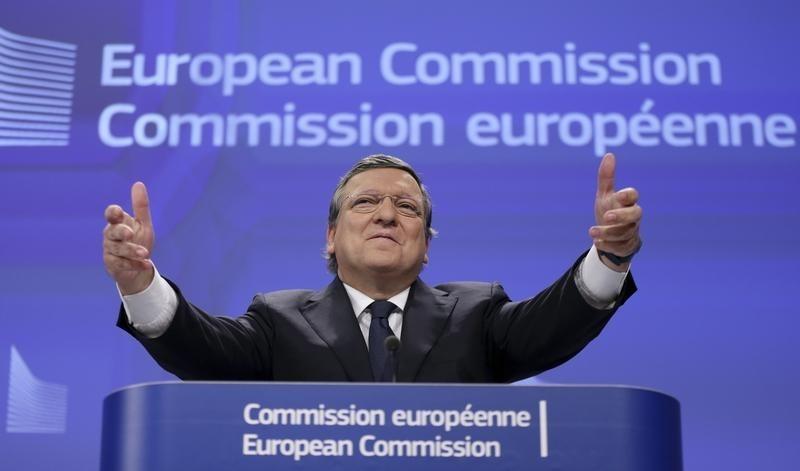Barroso’s Goldman job hits post-Brexit EU as it battles for trust
BRUSSELS (Reuters) – EU officials are livid at their former boss Jose Manuel Barroso for taking a job at Goldman Sachs that has drawn public scorn just as they are trying to win back trust in a European Union wounded by Britain’s Brexit vote.

But despite a vocal campaign by EU staff and a formal demand for action from the bloc’s ethics watchdog, the European Commission and Barroso’s successor as president Jean-Claude Juncker, see little they can do — beyond distancing themselves from the former Portuguese premier’s move to the U.S. bank.
The row began two months ago when Barroso, a conservative who led the EU executive for a decade until 2014, was unveiled by Goldman [GSGSC.UL] as non-executive chairman of its London-based international arm with a special role in advising on the Brexit process triggered by the British referendum on June 23.
It flared again this week just as EU leaders, back from summer breaks, are preparing a major push for hearts and minds that they hope can start restoring trust in institutions assailed across the continent by eurosceptic insurgent parties.
European Ombudsman Emily O’Reilly, citing among other evidence of public unease a petition run by EU staff that has over 130,000 signatures, wrote to Juncker asking whether he will convene an ethics review of his predecessor’s action, amend the code of conduct or issue special guidance to the Union’s Brexit negotiators on how to handle any contact with their former boss.
“Mr. Barroso’s move has generated concern at a very challenging time for the EU and particularly in relation to citizen trust in its institutions,” she wrote.
“WORST POSSIBLE MOMENT”
Juncker, who is preparing for his annual keynote State of the Union address to the European Parliament next Wednesday, has publicly distanced himself from Barroso, telling French television in July that he would not have taken the job.
Aides have made clear the former Luxembourg premier is far from impressed with his predecessor for joining a firm which many Europeans see as having an unprincipled hand in triggering the 2008 financial crisis still scarring the continent today. It risks denting his own efforts to break perceptions of the EU as a cozy, technocratic club for political and business elites.
“It is, at the worst possible moment, a disastrous symbol for the Union and a gift horse for the europhobes that a former Commission president is associated with the unbridled and unethical financial values that Goldman Sachs represents,” wrote a group of anonymous EU staffers in an online petition.
Reuters contacted one of the organizers of the petition to demand Juncker take “exemplary measures” against Barroso. It had over 132,000 signatures on change.org by late Wednesday and, the person said, had seen a sharp acceleration in support this week.
The problem for Juncker, EU officials say, is that the code of conduct for former commissioners allows the Commission to bar them from certain activities only for 18 months after stepping down. Barroso took his job in London 20 months afterwards.
He could not immediately be contacted on Wednesday but people who know him have told Reuters Barroso sees the role at Goldman as an important one that he is entitled to take after long years of public service. Allies note that much of the criticism has come from long-time opponents on the left. French President Francois Hollande called it “morally unacceptable”.
REVOLVING DOORS
EU officials argue that the Commission has some of the world’s strictest rules on what are known as “revolving door” job moves by senior officials into the private sector and that after 18 months inside knowledge and contacts lose their value and so no longer raise issues of conflict of interest.
One EU official argued that it was Goldman Sachs’ specific reputation among sections of the European population that posed the biggest problem; another bank, another Wall Street name, might not have caused so much fuss. But short of keeping a list of politically “toxic” companies for which former commissioners should never work, there may be little the Commission can do.
“When it comes to broader moral and ethical questions raised by personal choices of former senior staff, can they really be reasonably defined and governed by a set of regulations?” a Commission spokesman said.
As a result, officials say, it is hard to see the Commission acting further on the Barroso case, no matter how embarrassing its effect on public perceptions as EU leaders prepare for a summit next week in Bratislava on how to restore public trust.

